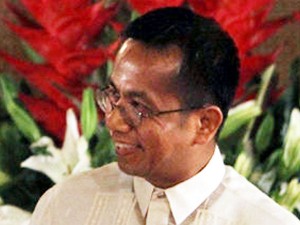PH economy to stay strong amid stock market, peso fall, says Balisacan
MANILA, Philippines — The latest financial market woes are likely temporary and incapable of dragging the Philippine economy’s strong growth performance.
This was according to Socioeconomic Planning Secretary Arsenio Balisacan, who said the recent fall of stock prices and depreciation of the peso have not been significant enough to eventually hurt the real economy.
“The country’s macroeconomic fundamentals are pretty strong and are not vulnerable to the effects [of the latest financial market developments],” Balisacan said.
He added that the government’s official economic growth target of 6 to 7 percent for this year need not be adjusted just because of the latest developments in the equities and foreign-exchange markets.
Balisacan opined that the drop in the Philippine Stock Exchange Index (PSEi) over the past few weeks was only a correction given the steep rise seen earlier in the year that made the average price-earnings ratio in the Philippines one of the highest in the world.
After going beyond the 7,000 level earlier this year, the PSEi has fallen in recent weeks to now hover below 6,000.
On the peso, now in the 43-to-a-dollar territory, Balisacan said its depreciation against the US dollar would actually bring benefits to the economy.
“This will be an advantage not only for the exporters but also for domestic industries whose products compete with imported goods,” Balisacan said.
Last year, the peso became one of the fastest appreciating currencies against the US dollar. It appreciated by nearly 7 percent throughout 2012 to close at 41.05:$1 on the last trading day of the year.
The strengthening of the peso elicited complaints from exporters, who claimed this was making Philippine goods more expensive for foreign buyers and, therefore, less competitive in the global market.
Balisacan said the latest fall of the peso, therefore, should serve as a relief for the export sector, which has suffered from declining revenues due to lackluster global demand.
In the meantime, Finance Secretary Cesar Purisima said the country should only keep its macroeconomic fundamentals healthy to avoid sustained exit of foreign portfolio capital.
“The best thing we can do is to continue up the path of better economic fundamentals so business will continue to thrive,” said in a text message to the Philippine Daily Inquirer.
Purisima said the Department of Finance would not impose a tax on exit of foreign capital just to temper volatility in the financial market.
“Imposing a tax on capital outflows will hurt us in the long run as it will scare capital away,” Purisima said.
Withdrawal of foreign portfolio investments is blamed for the drop of local stock prices and the depreciation of the peso.
The exit of foreign capital from the Philippines and other emerging markets is linked to speculations that the US Federal Reserve would soon end its stimulus program, under which it has been injecting enormous liquidity to help boost growth of the US economy.















